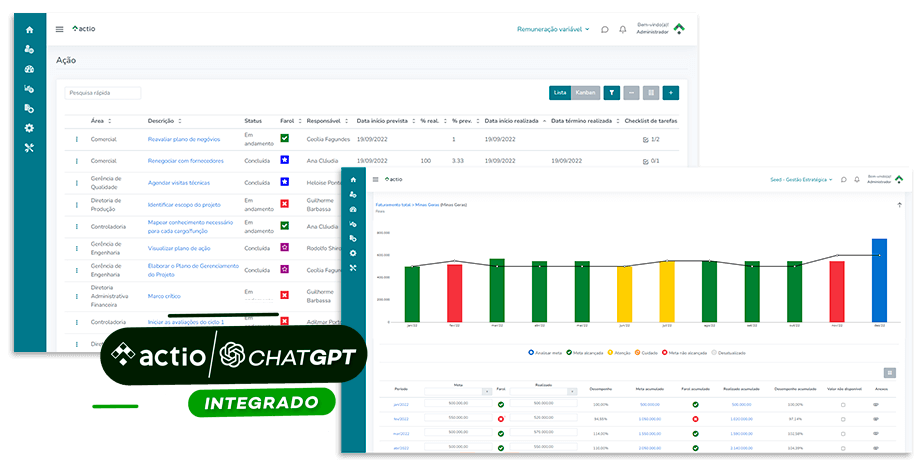Did you know that according to Great Place to Work, 37% of workers consider awards, bonuses, and incentives in general as fundamental aspects of maintaining good performance at work?
Employee recognition has been a persistent challenge in effective management for a long time. However, today, as the talent competition intensifies, the ways organizations demonstrate valuing their employees have become more crucial than ever.
If you weren’t aware of these data, don’t worry. In this blog, we’ll cover everything you need to know about performance bonuses. Happy reading!
What you will find on this blog:
ToggleWhat is a performance-based bonus?

As the name suggests, a performance bonus is a financial incentive companies offer to recognize and reward exceptional employee performance.
Moreover, this benefit is an additional bonus to the fixed salary linked to achieving specific goals set by the company.
Unlike the monthly fixed salary, the performance bonus is a form of recognition for good performance, supported by academic studies highlighting the importance of compensation as an attractive factor for qualified professionals.
Thus, this strategy aims to engage employees and drive individual effort towards measurable goals. Additionally, this practice aims to improve the organizational climate, increase productivity, and retain talent.
But remember: bonuses should be separated from salary increases and other benefits, directly tied to measurable goals aligned with the company’s objectives and the individual’s contribution to those goals.
Looking for bonus software? Discover Score by Actio!
What is the difference between a bonus and salary compensation?

The difference between a bonus and salary compensation lies in the fact that the bonus is a reward the employer grants to the employee in recognition of their performance. In contrast, salary compensation refers to the fixed amount established in the employment contract that the employer must pay regularly.
Unlike salary compensation, the bonus is not a mandatory part of the salary and is not subject to the exact charges, such as social security or unemployment fund contributions. In some cases, the terms “bonus” and “gratuity” are used interchangeably, as there is no clear distinction between them in labor laws.
Additionally, companies can grant bonuses individually or collectively, offering benefits such as extra money, trips, courses, time off, and gift cards, among others, as recognition for employees’ good performance.
What are the types of bonuses?
Organizations can grant various types of compensation in a performance bonus system. Here are some of the most common types used to recognize employees who achieve success in their deliveries.
1- Sales Commissions
Commissions represent a share of the company’s profits that employees who achieve sales goals can earn. For example, a professional who receives a 5% commission on each sale can increase their income over time, supplementing their salary.
2- Fixed Bonus
Fixed bonuses are granted by adding a predetermined amount to an employee’s salary.
In this way, companies offer this bonus as recognition for a specific achievement or event in the workplace.
3- Performance Bonus
A performance-linked bonus consists of an additional payment as a reward for high productivity.
This serves as an incentive for employees to maintain high levels of efficiency and achieve increasingly better results.
4- Team Goal Bonus
After collaborating to achieve a common goal, some companies provide performance bonuses to entire departments or teams.
5- Seasonal Bonus
A seasonal bonus is a gift company usually offers employees during specific times of the year, such as Christmas.
Additionally, this practice aims to express gratitude for employees’ efforts and motivate them to maintain positive performance in the future.
The importance of performance bonuses

Recognition gives employees the feeling that promotions are fair, encouraging innovation and additional efforts.
Thus, comparing the overall experience of employees who receive credit with those who do not, a strong connection between recognition and various aspects of a positive corporate culture is observed.
Compared to those who do not feel recognized at work, employees who feel recognized exhibit the following characteristics:
- 2.6 times more likely to believe in the fairness of promotions.
- 2.2 times more likely to drive innovation and present new ideas.
- 2.0 times more likely to say that people are willing to go beyond expectations.
Furthermore, gratitude can make employees 69% more likely to put in extra effort at the workplace.
How do we implement performance bonuses?
To effectively implement a performance bonus plan, following some steps and defining specific criteria is crucial. Below are the main ones:
1- Team Profile
Firstly, knowing your employees and understanding their preferences regarding incentives is essential.
Therefore, solicit feedback to ensure that the benefits align with their expectations and are truly motivating.
2- Budget
Clearly define how much you can allocate in resources for this purpose.
Thus, having a clear budget helps avoid surprises and ensures the sustainability of the bonus plan.
3- Goal Plan
Establish precise, clear, and realistic goals. Additionally, it is crucial to avoid obstacles at the time of the award and ensure that the bonus plan’s effect is positive, as desired.
4- Strategic Partnerships
Business success often depends on strong partnerships. Seize this opportunity and seek collaborations with institutions that can offer discounts on products and services as a bonus.
5- Effective Communication
All employees must clearly understand how the bonus plan works and what actions are necessary to achieve it.
Therefore, ensure effective communication to avoid misunderstandings and maximize engagement.
6- Timely Reward
Avoid delays in bonus payments. Fulfilling promised dates is fundamental to avoiding employee frustrations and maintaining the plan’s effectiveness.
By following these steps and criteria, you are more likely to implement a performance bonus plan that is effective and well-received by the team.
What problems can occur in implementation, and how can they be avoided?

Potential challenges are associated with implementing performance bonus programs, which can be avoided through careful planning. Some of these issues include:
1- Unattainable Goals
Employees may experience frustration, demotivation, and even stress if the established goals are excessively high or unrealistic. Therefore, it is essential to set challenging but achievable goals.
2- Contextless Rewards
The bonus can lose its relevance and meaning if it is not directly related to effective employee performance.
Thus, it is crucial to ensure a clear connection between the results achieved and the rewards offered.
3- Frequent Bonuses
Granting bonuses too frequently can reduce their motivational impact, turning them into normal expectations for employees.
In other words, establishing a balanced recognition system is essential to preserve the effectiveness of this incentive.
4- Competition Among Employees
Lastly, setting fair goals for all team members is vital to avoid creating a harmful competitive environment. Collaborative plans that promote cooperation are preferable, thus preventing internal rivalries.
However, with proper planning and clear communication, these challenges can be mitigated, ensuring that performance bonus programs achieve their goals of motivating employees and boosting performance without generating negative impacts.
Why invest in result bonuses with the help of software?

Technology can be an ally in choosing the remuneration that best suits your company. Therefore, Actio has developed Score software, which seeks transparency in disclosing goals achieved and employee bonuses. Falconi, the largest consultancy in Brazil, which, in addition, seeks to bring transparency in the disclosure of goals achieved and in employee bonuses.
With Score by Actio, you will have real-time access to individual results, allowing clear visibility in the variable remuneration process. The software also calculates commissions, ICP, PLR, bonuses, ILP, and much more, adapting to your organization’s specific needs. If facing challenges in this area, consider Actio’s software to simplify the process.
Frequently Asked Questions
1- When is a performance bonus granted?
A performance bonus is granted when an employee achieves pre-established goals, such as increased sales, demonstrated task performance efficiency, and effective team collaboration.
Additionally, this benefit can be a percentage based on specific achievements, providing a sense of accomplishment and encouraging the pursuit of new challenges.
2- Who is entitled to a performance bonus?
All employees who meet the individual or collective goals of the company, as established in the award rules, have the right to receive amounts related to performance bonuses.
3- How does the payment of the bonus work?
Bonus payment on the payroll occurs when an employee receives an additional amount in addition to their base salary.
Furthermore, this gratification can be attributed to various reasons, such as exceptional performance, goal achievement, recognition of accomplishments, or relevant contributions.
4- What does a bonus for results mean?
A bonus for results is an incentive companies provide to their employees or teams that achieve specific goals.
5- What is the definition of a stock bonus?
A stock bonus involves the distribution of new shares to existing shareholders. Additionally, this process aims to provide liquidity to the market without impacting the company’s financial capital on the stock exchange.
Conclusion
As you can see, performance bonuses are a valuable tool to recognize and reward exceptional employee performance, promoting engagement, productivity, and talent retention in companies.
Furthermore, with effective communication and timely reward fulfillment, companies can reap the benefits of a positive and productive work environment.
Don’t forget to follow Actio on Instagram, Linkedin and Facebook.
Did you like the content? Tell me in the comments.






